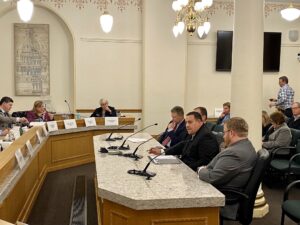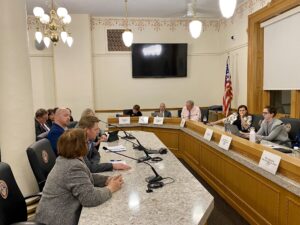House Bill 1025: “A Solution Seeking a Problem”
The Colorado Chamber and members of the business community testified in opposition to House Bill 1025 at the state capitol yesterday evening, successfully stalling the bill for the time being.
The bill would make it significantly more difficult for businesses to take the industrial energy use tax exemption, which is used across a variety of industries. The exemption has been in place for nearly 100 years, with the purpose of ensuring businesses are not double taxed for the energy they use to create a product.

Louis Lopez of Lockheed Martin testifying against HB 1025 in the House Energy & Environment Committee
HB 1025 would require any company taking this exemption to use meters to measure the energy they use. While the bill sponsors identified meters that could be purchased by companies for several hundred dollars to comply with the bill, in reality, the cost would be much more significant. From installation costs to monitoring costs to administrative costs, it’s no simple endeavor. Further, many businesses would have to purchase hundreds or even thousands of meters to measure the energy output of their machines – potentially leading to millions of dollars in new costs just to claim the tax exemption.
Ryan Woods, Chair of the Colorado Chamber’s Tax Policy Council, testified against the bill on behalf of the chamber in the House Energy and Environment Committee.
“From the largest global manufacturers to rural farms and ranches, Coloradans depend on the exemption to keep their costs competitive with those in other states,” said Woods. “In turn, these businesses support local communities through property taxes paid to local government, school districts, roads, bridges, public safety and other public investments. Many of these businesses are the main employer in the region.”

Ryan Woods, Chair of the Tax Policy Council, testifying against HB 1025.
Colorado Chamber member Lockheed Martin also testified against the bill in committee. Luis Lopez, representing Lockheed, explained the complexity of the manufacturing devices they operate and the logistical issues with installing meters on various machines.
Lopez estimated that each meter would cost roughly $2,000 to install. With approximately 2,000 machines that would require these devices, that would amount to about $4 million dollars to install the devices.
“That’s a significant cost for our operations,” Lopez said.
Several other members of the Colorado Chamber testified in opposition to the bill, including the Colorado Restaurant Association, the Colorado Mining Association and the Grand Junction Chamber of Commerce on behalf of local businesses. The consensus among witnesses testifying for the business community was that this bill is “a solution seeking a problem.”
After hearing the HB 1025 for two hours, the committee decided to lay the bill over – meaning it is temporarily halted. It’s expected to be amended in the future.
